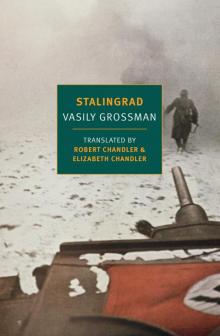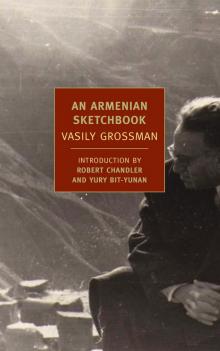- Home
- Vasily Grossman
The Road Page 4
The Road Read online
Page 4
Lev Sergeyevich Orlov was standing on a street corner with his colleague Timofeyev. Timofeyev was saying, “You’re being an old woman, Lev Sergeyevich. We could go to a beer hall or a restaurant. We could just wander about and watch the crowds. So what if it upsets your wife? You’re an old woman, the most complete and utter old woman!”
But Lev Sergeyevich said goodbye and went on his way. Morose by nature, he used to say of himself, “I’m made in such a way that I see what is tragic, even when it’s covered by rose petals.”
And Lev Sergeyevich truly did see tragedy everywhere.
Even now as he made his way through the crowds he was thinking how awful it must feel to be stuck in a hospital during these days of merriment, how miserable these days must be for pharmacists, engine drivers, and train crews—people who have to work on the First of May.
When he got home, he said all this to his wife. She began to laugh at him, but he just shook his head and carried on being upset.
Still turning over the same thoughts, he continued to let out loud sighs until late into the night. His wife said angrily, “Lyova, why do you have to feel so sorry for the pharmacists? Why not feel sorry for me for a change and let me sleep? You know I’ve got to be at work by eight o’clock.”
And, the next day, she did indeed leave for work while Lev Sergeyevich was still asleep.
In the mornings he was usually in a good mood at the office, but by two in the afternoon he would be missing his wife, feeling anxious and fidgety and constantly watching the clock. His colleagues understood all this and used to make fun of him.
“Lev Sergeyevich is already looking at the clock,” someone would say—and everyone would laugh except for Agnessa Petrovna, the elderly head accountant, who would pronounce with a sigh: “Orlov’s wife is the luckiest woman in all Moscow.”
This day was no different. As the afternoon wore on, he grew fidgety, shrugging his shoulders in disbelief as he watched the minute hand of the clock.
“Someone to speak to you, Lev Sergeyevich,” a voice called from the adjoining room. It turned out to be his wife—phoning to say that she would have to stay on at work for an extra hour and a half to retype the director’s report.
“All right then,” Lev Sergeyevich replied in a hurt voice, and he hung up.
He did not hurry home. The city was buzzing, and the buildings, streets, and sidewalks all seemed somehow special, not like themselves at all. And this intangible something, born of the May Day sense of community, took many forms. It could be sensed even in the way a policeman was dragging away a drunk. It was as though all the men wandering about the street were related—as though they were all cousins, or uncles and nephews.
Today he would have been only too glad to saunter about with Timofeyev. It was unpleasant being the first to get back home. The room always seems empty and unwelcoming, and there is no getting away from frightening thoughts: What if something had happened to Vera Ignatyevna? What if she had twisted her ankle jumping off a tram?
Lev Sergeyevich would start to imagine that some hulking trolley car had knocked Vera Ignatyevna down, that people were crowding around her body, that an ambulance was tearing along, wailing ominously. He would be seized with terror; he would want to phone friends and family; he would want to rush to the Emergency First-Aid Institute or to the police.
Every time his wife was ten or fifteen minutes late it was the same. He would feel the same panic.
What a lot of people there were on the street now! Why were they all sauntering up and down the boulevard, sitting idly on benches, stopping in front of every illuminated shop window? But then he came to his own building, and his heart leaped for joy. The little ventilation pane was open—his wife was already back.
He kissed Vera Ignatyevna several times. He looked into her eyes and stroked her hair.
“What a strange one you are!” she said. “It’s the same every time. Anyone would think I’ve come back from Australia, not from the Central Rubber Office.”
“If I don’t see you all day,” he replied, “you might just as well be in Australia.”
“You and your eternal Australia!” said Vera Ignatyevna. “They ask me to help type the wall newspaper—and I refuse. I skip Air-Chem Defense Society meetings and come rushing back home. Kazakova has two little children—but Kazakova has no trouble at all staying behind. And that’s not all—she’s a member of the automobile club as well!”
“What a silly darling goose you are!” said Lev Sergeyevich. “Who ever heard of a wife giving her husband a hard time for being too much of a stay-at-home?”
Vera Ignatyevna wanted to answer back, but instead she said in an excited voice, “I’ve got a surprise for you! The Party committee’s been asking people to take in orphanage children for a few days over the holiday. I volunteered—I said we’d like a little girl. You won’t be cross with me, will you?”
Lev Sergeyevich gave his wife a hug.
“How could I be cross with my clever girl?” he said. “It scares me even to think about what I’d be doing and how I’d be living now if chance hadn’t brought us together at that birthday party at the Kotelkovs.”
On the evening of April 29, Vera Ignatyevna was brought back home in a Ford. As she went up the stairs, pink with pleasure, she said to the little girl who had come with her, “What a treat to go for a ride in a car. I could have carried on riding around for the rest of my life!”
It was the second time Vera Ignatyevna had been in a car. Two years before, when her mother-in-law had come to visit, they had taken a taxi from the station. True, that first ride had not been all it might have been—the driver had never stopped cursing, saying his tires would probably collapse and that, with such a mountain of luggage, they should have taken a three-ton truck.
Vera Ignatyevna and her little guest had barely entered the room when the doorbell rang.
“Ah, it must be Uncle Lyova,” said Vera Ignatyevna. She took the little girl by the hand and led her toward the door.
“Let me introduce you,” she said. “This is Ksenya Mayorova, and this is comrade Orlov, Uncle Lyova, my husband.”
“Greetings, my child!” said Orlov, and patted the little girl on the head.
He felt disappointed. He had imagined the little girl would be tiny and pretty, with sad eyes like the eyes of a grown-up woman. Ksenya Mayorova, however, was plain and stocky, with fat red cheeks, lips that stuck out a little, and eyes that were gray and narrow.
“We came by car,” she boasted in a deep voice.
While Vera Ignatyevna was preparing supper, Ksenya wandered about the room examining everything.
“Auntie, have you got a radio?” she asked.
“No, darling. But come here—there’s something we have to do.”
Vera Ignatyevna took her into the bathroom. There they talked about the zoo and the planetarium.
During supper Ksenya looked at Lev Sergeyevich, laughed, and said pointedly, “Uncle didn’t wash his hands!”
She had a deep voice, but her laugh was thin and giggly.
Vera Ignatyevna asked Ksenya how much seven and eight came to, and what was the German word for a door. She asked her if she knew how to skate. They argued about what was the capital of Belgium; Vera Ignatyevna thought it was Antwerp. “No, it’s Geneva,” Ksenya insisted, pouting and stubbornly shaking her head.
Lev Sergeyevich took his wife aside and whispered, “Put her to bed. Then I’ll sit with her and tell her a story—she doesn’t feel at home with us yet.”
“Why don’t you go out into the corridor and have a smoke?” answered his wife. “In the meantime we can air the room.”
Lev Sergeyevich walked up and down the corridor and struggled to recall a fairy tale. Little Red Riding Hood? No, she probably knew it already. Maybe he should just tell her about the quiet little town of Kasimov, about the forests there, about going for walks on the bank of the Oka—about his grandmother, about his brother, about his sisters?
When his wif
e called him back, Ksenya was already in bed. Lev Sergeyevich sat down beside her and patted her on the head.
“Well,” he asked, “how do you like it here?”
Ksenya yawned convulsively and rubbed her eyes with one fist.
“It’s all right,” she said. “But it must be very hard for you without a radio.”
Lev Sergeyevich began recounting stories from his childhood. Ksenya yawned three times in quick succession and said, “You shouldn’t sit on someone’s bed if you’re wearing clothes. Microbes can crawl off you.”
Her eyes closed. Half asleep, she began mumbling incoherently, telling some crazy story.
“Yes,” she whined. “They didn’t let me go on the excursion. Lidka saw when we were still in the garden...Why didn’t she say anything...?And I carried it twice in my pocket...I’ve been pricked all over...but it wasn’t me who told them about the glass, she’s a sneak...”
She fell asleep. Lev Sergeyevich and his wife went on looking at her face in silence. She was sleeping very quietly, her lips sticking out more than ever, her reddish pigtails moving very slightly against the pillow.
Where was she from? The Ukraine, the north Caucasus, the Volga? Who had her father been? Perhaps he had died doing some glorious work in a mine or in the smoke of some huge furnace? Perhaps he had drowned while floating timber down a river? Who had he been? A mechanic? A porter? A housepainter? A shopkeeper? There was something magnificent and touching about this peacefully sleeping little girl.
In the morning Vera Ignatyevna went off to do some shopping. She needed to stock up for the three days of the holiday. She also wanted to go to the Mostorg Department Store and buy some silk for a summer dress. Lev Sergeyevich and Ksenya stayed behind.
“Listen, mein liebes Kind,” he said. “We’re not going out anywhere today, we’re going to stay at home.”
He sat Ksenya down on his knee, put an arm around her shoulder, and began telling her stories.
“Sit still now, be a good girl,” he would say every time she tried to get down. In the end Ksenya sat still, snuffling occasionally as she watched this talking uncle.
By the time Vera Ignatyevna got back, it was already four o’clock. There had been a lot of people in the shops.
“Why are you looking so sulky, Ksenya?” she asked in a startled voice.
“Why shouldn’t I look sulky?” Ksenya answered. “Maybe I’m hungry.”
Vera Ignatyevna hurried into the kitchen to prepare supper; Lev Sergeyevich carried on entertaining their little guest.
After supper, Ksenya asked for a pencil and some paper, so she could write a letter. “But I don’t need a stamp,” she added. “I’ll give it to Lidka myself.”
While Ksenya was writing, Vera Ignatyevna suggested to her husband that they all go out to the cinema, but Lev Sergeyevich did not like this idea. “What on earth are you thinking of, Vera? The crowds tonight will be terrible. In the first place we won’t be able to get tickets. In the second place, it’s the kind of evening one wants to spend at home.”
“It’s our good fortune to spend all our evenings at home,” retorted Vera Ignatyevna.
“Please don’t start an argument,” snapped Lev Sergeyevich.
“The girl’s bored. She’s used to being with other people all the time. She’s used to being with her friends.”
“Oh, Vera, Vera,” he replied.
Later in the evening they all had tea with cornel jam, and they ate a cake and some pastries. Ksenya enjoyed the cake very much indeed; Vera Ignatyevna felt worried, put her hand on the little girl’s tummy, and shook her head. Soon afterward the girl’s tummy did indeed start to ache. She turned very sullen and stood for a long time by the window, pressing her nose to the cold glass. When the glass became warm, she moved along a little and began to warm another patch of glass with her nose.
Lev Sergeyevich went up to her and asked, “What are you thinking about?”
“Everything,” the girl answered crossly, and went back to squashing her nose into the glass.
In the orphanage they were probably about to have supper. There hadn’t been time for her to receive her present, and she was sure to be left something boring, like a book about animals. She already had one of those. Still, she’d be able to do a swap. This Auntie Vera was really nice. A pity she wasn’t one of the staff. The girls who’d stayed behind in the orphanage were going to spend all day riding about in a truck. As for herself, she was going to become a pilot and drop a gas bomb on this strange Uncle Lyova...There were some quite big girls out in the yard...they were probably from group seven.
She dozed off on her feet and banged her forehead against the glass.
“Go to bed, Ksenka!” said Vera Ignatyevna.
“I butted the glass just like a ram,” said Ksenya.
Lev Sergeyevich woke up in the night. He put out a hand to touch his wife’s shoulder, but she wasn’t there.
“What’s up? Where’s my darling Verochka?” he thought in alarm.
He could hear a quiet voice coming from the sofa, and sobs.
“Calm down now, you silly thing,” Vera Ignatyevna was saying. “How can I take you back at night? There aren’t any trams, and we’d have to walk all the way across Moscow.”
“I kno-o-o-w,” answered a deep voice, in between sobs. “But he’s so very dismable.”
“Never mind, never mind. He’s kind, he’s good. You can see I’m not crying!”
Lev Sergeyevich covered his head with the blanket, so as not to hear any more. Pretending he was asleep, he began quietly snoring.
A Young Woman and an Old Woman*
Stepanida Yegorovna Goryacheva, head of a department of an All-Union People’s Commissariat, was leaving for the Crimea that evening. Her vacation began on August 1, but since July 30 was a Saturday, she had decided to leave early, on the evening of the twenty-ninth.
First, however, she had to hurry straight from her office to her dacha in Kuntsevo. Her car was being serviced; afraid of being late, she telephoned her old comrade Cheryomushkin. In 1932 they had worked in the same brigade on a State grain farm; they had both been assistants to the operator of the combine harvester. Cheryomushkin immediately sent over a car—an M-1.
Now she was being driven down the broad new highway to Kuntsevo.
“What’s that knocking?” Goryacheva asked the driver.
The driver gave her a sideways look, licked his upper lip, and by way of reply, asked a question himself: “Will you be needing me long?”
“I shall be needing you for as long as I need you.”
“The car should have gone in for a service today. I told Cheryomushkin.”
“I have to be at the station by eleven. I can’t let you go until then.”
Goryacheva glanced at the driver several times, but she did not say any more to him; he really did look very sullen. They continued along the road. Coming from the opposite direction were other M-1s, their paintwork gleaming, and long ZIS’s—beige, green, or black. At intervals along the highway, which was delineated by a broken white line, were benches with awnings, so that people could wait for buses in comfort, and smart, brightly colored little bridges at places where pedestrians needed to cross over. There were also policemen in white gloves, patrolling the highway with the unhurried calm of men aware of their power. None of the cars was traveling at a speed of less than seventy kilometers an hour—barely had Goryacheva noticed a black point on the gray, matte roadway than this point began to increase in size with precipitate swiftness. And only a few seconds later she glimpsed people’s faces, shining glass, and then the oncoming car was gone—as if it had never been there at all, as if she had simply imagined a forage cap, a heap of wildflowers, a woman’s head below a broad hat. Equally swift, equally precipitate in their appearance and disappearance were a wooden shelter, little wooden houses with little windows crowded with flowerpots, and a woman in a black dress who was grazing a goat.
Goryacheva had driven to the dacha many times, and
she was still always struck by this troubling swiftness, by the ease with which objects, people, and animals appeared, grew bigger, and then disappeared in a flash. In the dacha lived her mother, Marya Ivanovna, and her two nieces—Vera and Natashka, the daughters of her late sister. It was a big luxurious dacha, and she and her family shared the eight rooms with the family of another senior official. Until 1937 a certain Yezhegulsky, a man without any children, had lived there with his wife and his old father. Yezhegulsky had been arrested as an enemy of the people; it was over a year now since Goryacheva had moved in, and there was nothing left to recall Yezhegulsky’s existence except for the yellow lilies his father had planted outside the windows. And her fellow occupant, Senyatin—a director of the People’s Commissariat of State Farms—had once shown her a large chest he had found in a shed. It was filled with pinecones, each one wrapped in its own piece of white paper and surrounded by cotton wool. Some of the cones were huge, like strange birds whose wooden feathers, adorned with drops of amber resin, were all standing on end; some were tiny, smaller than acorns. There were pinecones from the Mediterranean and pinecones from the far north of Siberia. These hundreds of pinecones had been collected by the former occupant of their dacha. There was something comical about all these pinecones of different sizes, all so decorous and self-important, all of them wrapped like little dolls in paper and cotton wool. Goryacheva and Senyatin had looked at each other, shaken their heads, and smiled.
“We’ll just have to burn them in the stove,” she had said. “We can’t even use them for the samovar—hand grenades like these are too big!”
“What do you mean, comrade Goryacheva?” Senyatin had answered. “You’re lacking in consciousness. To a botanist they could be of real value. I’ll take the box to the Young Naturalists—or else to a museum.”
The car drew up outside the dacha. While Goryacheva was still talking to the driver, discussing what time they’d need to leave for the station, Vera and Natashka came running to meet her. Their grandmother, Marya Ivanovna, followed them out of the house. The driver parked the car in the shade, on some grass near the gate, as if it were nicer and more fun for the car to stand on fresh grass and in the shade of tall trees. He walked slowly around the car, admired the pneumatic tires, kicked one of them with his boot—not to check its condition but simply for his own satisfaction—wiped the windscreen with his sleeve, shook his head a little, walked over toward the fence, and lay down on the grass. The car smelled of gasoline and hot oil. He breathed this in with delight and thought, “She’s had a good run, she’s worked up a sweat.”

 Life and Fate
Life and Fate Everything Flows
Everything Flows Stalingrad
Stalingrad An Armenian Sketchbook
An Armenian Sketchbook The Road
The Road A Writer at War
A Writer at War